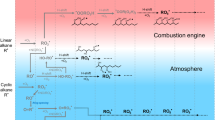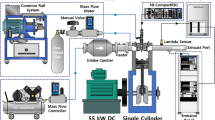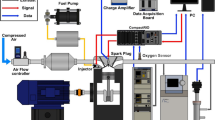Abstract
THERE is evidence that the phenomenon of 'knock' in spark-ignition engines is connected with the production of peroxides in the last part of the fuel-air mixture to be burnt. Thus we have found that of all the intermediate products of combustion which have been identified in the gases sampled from the engine, the peroxides are the only ones which possess an appreciable pro-'knock' effect. Egerton et al.1 have shown that peroxides, probably alkyl hydroperoxides, are present in the pre-combustion processes, and Stern and Polliak2 have identified hydrogen peroxide in samples taken from an engine cylinder. This work has now been extended to enable quantitative determinations to be made of the total peroxide content of gas samples. At the same time, we have determined the aldehyde content.
This is a preview of subscription content, access via your institution
Access options
Subscribe to this journal
Receive 51 print issues and online access
$199.00 per year
only $3.90 per issue
Buy this article
- Purchase on Springer Link
- Instant access to full article PDF
Prices may be subject to local taxes which are calculated during checkout
Similar content being viewed by others
References
Phil. Trans. Roy. Soc., A, 234, 433 (1935).
Trudy Vsesoyus Konfirentsii Anal. Khim., 2, 603 (1943).
Ind. and Eng. Chem., Anal. Edit., 6. 241 (1934).
Author information
Authors and Affiliations
Rights and permissions
About this article
Cite this article
WHEELER, R., DOWNS, D. & WALSH, A. 'Knock' in Internal Combustion Engines. Nature 162, 893–894 (1948). https://doi.org/10.1038/162893a0
Issue Date:
DOI: https://doi.org/10.1038/162893a0
This article is cited by
-
Knock in Internal Combustion Engines
Nature (1949)
Comments
By submitting a comment you agree to abide by our Terms and Community Guidelines. If you find something abusive or that does not comply with our terms or guidelines please flag it as inappropriate.



